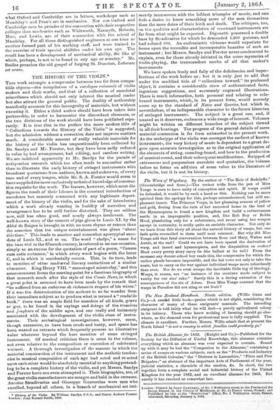The Wars of Wapsburg. By the author of " The
Heir of Redclyffe." (Groombridge and Sons.)—The veriest trifle from the pen of Miss Yonge is sure to have unity of conception and spirit. If wasps could be defended, it would be by such a hand as this. Nothing can be more spirited than the apology for this, perhaps misunderstood, but still un- pleasant insect. The Princess Vespa, in her gleaming armour of yellow and gold, fleeing from the ruin of her ancestral home in the land of the Hymenoptera to found a new kingdom and build a subterranean castle in an impregnable position, and, like Rob Roy or Robin Hood, plundering only for a subsistence, and never using her weapon except in extremity, is really quite an amiable character. Not only do we learn from this story all about the natural history of wasps, but one feels quite reconciled to them until next summer. But why did Miss Yonge add that fatal conversation between Rose and Mary, Walter and Annie, at the end? Could we not have been spared the derivation of wasp, and insect and hymenoptera, and the disquisition on crabro? Must every pretty story carry its blue ballast at its tail ? From the moment any decent school boy reads this, the compromise for which the author pleads becomes impossible, and the lad vows not only to take the nests, but to carry on the war against individual wasps more relentlessly than ever. Nor do we even escape the inevitable little tag of theology. Wasps, it seems, are "an instance of the creature made subject to vanity for our sins' sake." Surely this is a daring extension of the consequences of the sin of Adam. Does Miss Yonge contend that the wasps in Paradise did not sting or eat fruit ?
















































 Previous page
Previous page